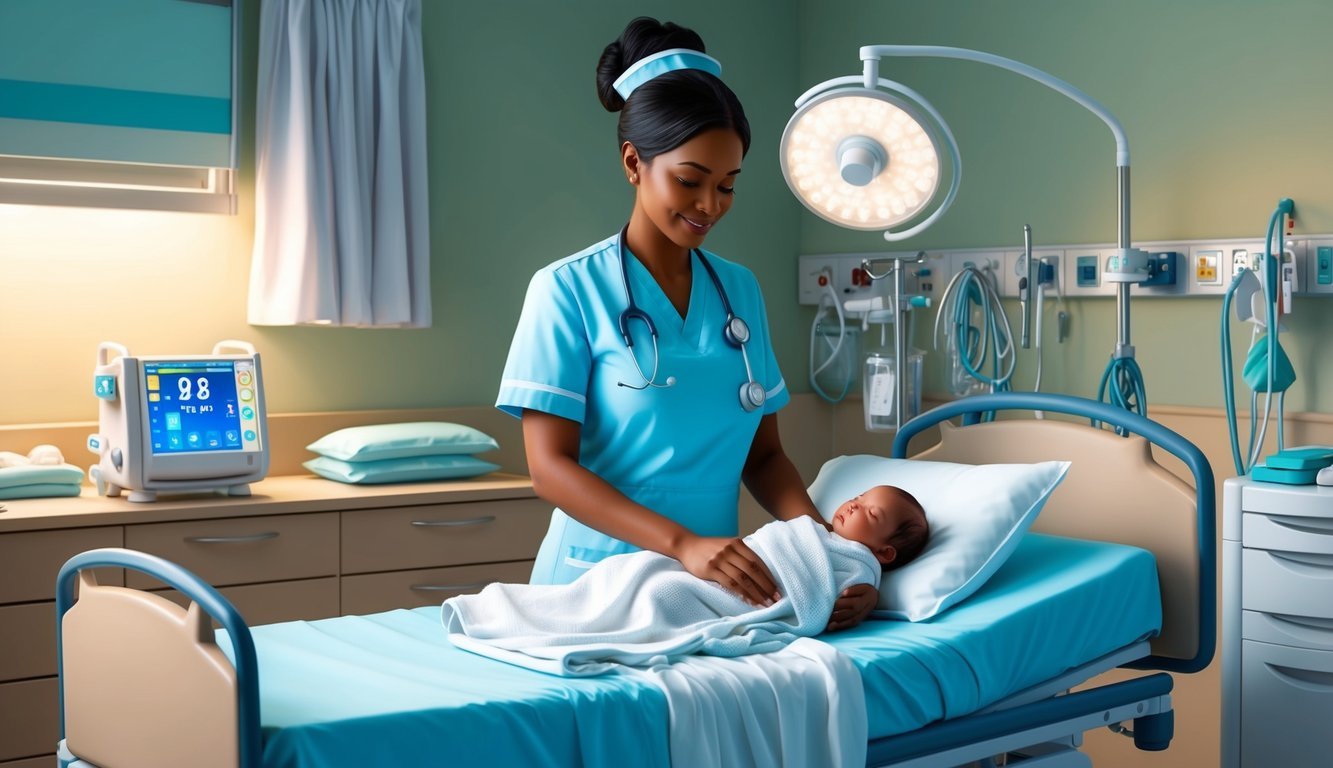A maternity nurse plays a vital role in providing care during one of life’s most significant moments—childbirth. These healthcare professionals support mothers and their newborns by offering expert guidance, education, and emotional support.
Their work involves everything from prenatal education to helping with breastfeeding, ensuring both mother and baby are healthy and thriving.
Taking the path to becoming a maternity nurse requires dedication and compassion.
You will need specialized training and skills to navigate the challenges of maternity care.
It’s an opportunity to make a meaningful impact on families during a transformative time in their lives.
Whether you are considering a career in maternity nursing or simply want to understand what they do, this article will shed light on the essential functions and responsibilities of maternity nurses.
You’ll learn how they contribute to positive birth experiences and support new parents as they adjust to their roles.
Key Takeaways
- Maternity nurses provide crucial care during childbirth and the postpartum period.
- This career offers numerous opportunities for professional growth and development.
- Excellence in maternity nursing involves both clinical skills and compassionate patient support.
Essentials of Maternity Nursing
Maternity nursing is a vital field focused on the care of women during pregnancy, childbirth, and postpartum.
Understanding educational pathways, core competencies, and available certifications is essential for aspiring maternity nurses.
Educational Pathways
To become a maternity nurse, you typically need a nursing degree.
There are two main educational pathways:
| Degree Type | Description |
|---|---|
| Associate Degree in Nursing (ADN) | A two-year program that allows you to become a Registered Nurse (RN). This option provides a solid foundation in nursing basics and is the quickest route to enter the workforce. |
| Bachelor of Science in Nursing (BSN) | A four-year degree that offers advanced training and is preferred by many employers. A BSN may also provide more opportunities for leadership roles and specialized nursing fields. |
After completing your degree, you must pass the NCLEX-RN exam to obtain your nursing license.
Core Competencies in Maternity Nursing
Maternity nurses need a range of core competencies to provide high-quality care.
Key areas include:
- Clinical Skills: Proficiency in prenatal and postnatal assessments, labor support, and neonatal care.
- Patient Education: Ability to educate families about pregnancy, childbirth options, and postpartum recovery.
- Communication: Effective communication skills to interact with patients, families, and healthcare teams.
Understanding these skills helps you deliver safe and compassionate care.
Keeping up with best practices is crucial in this rapidly evolving field.
Certifications for Maternity Nurses
Certifications enhance your credentials and expertise in maternity nursing.
Some important certifications include:
- Obstetric Nursing Certification (RNC-OB): Offered by the National Certification Corporation, it demonstrates specialized knowledge in obstetric care.
- Inpatient Obstetric Nursing Certification (RNC-OB): Focuses on care in a hospital setting, emphasizing skills needed for inpatient maternity care.
These certifications can improve job prospects and demonstrate your commitment to the profession.
It’s useful to look for resources from organizations like the National Certification Corporation for further details on certification processes and requirements.
Roles and Responsibilities

Maternity nurses play a vital role in supporting families during labor, delivery, and the challenging postpartum period.
They provide care to both mothers and newborns, ensuring a smooth adjustment to parenthood.
Labor and Delivery Support
During the labor and delivery process, you will assist mothers in various ways.
Your primary duties include monitoring vital signs and fetal heart rates.
You provide comfort measures such as breathing techniques and position changes.
You will also communicate with the healthcare team to ensure that any complications are promptly addressed.
This collaboration enhances patient care.
Additionally, you offer emotional support, helping mothers manage anxiety and stress during labor.
With your expertise, you guide families through the delivery experience, ensuring they feel safe and supported.
Postpartum and Newborn Care
After delivery, your role shifts to postpartum and newborn care.
You educate new parents on essential aspects of infant care, such as feeding, diapering, and bathing.
Your knowledge of newborn care techniques is crucial during this period.
You will monitor both the mother’s recovery and the baby’s health, checking for any signs of complications.
Emotional support is equally important, as new parents may feel overwhelmed.
You provide reassurance and guidance, helping them adjust to their new roles.
Effective communication ensures that parents understand their responsibilities in caring for their newborn.
Involvement in High-Risk Pregnancies
In cases of high-risk pregnancies, your responsibilities increase.
High-risk pregnancies may arise due to factors like maternal health conditions or complications during pregnancy.
You will monitor the mother and fetus closely, looking for any signs of distress.
You may work alongside specialized healthcare providers to create a comprehensive care plan.
Providing emotional support is vital, as families may feel anxious about the situation.
Your guidance helps them navigate these challenges while ensuring patient care remains a top priority.
The aim is to foster a supportive environment for both mothers and their babies during these vulnerable times.
Professional Skills and Environment

In the role of a maternity nurse, you engage with various skills in dynamic environments.
Your ability to communicate effectively, think critically, and collaborate within healthcare teams significantly impacts the quality of care for mothers and newborns.
Communication and Critical Thinking
Effective communication skills are essential for maternity nurses.
You must convey information clearly to mothers and their families, helping them understand the birthing process.
This includes discussing what to expect before, during, and after delivery.
Critical thinking is also crucial.
You need to assess each mother’s unique situation to provide tailored care.
For example, if a mother shows signs of distress, your ability to quickly evaluate her condition and decide the best course of action is vital.
Training programs can enhance these skills further, preparing you for diverse challenges in maternity care.
Working in Healthcare Teams
As a maternity nurse, you are part of a larger healthcare team.
This includes obstetricians, pediatricians, and other nursing staff.
Collaborative work is key in this environment, especially during labor and delivery when quick decisions must be made.
Effective teamwork relies on mutual respect and understanding.
You coordinate with other healthcare professionals to share insights about a mother’s care.
For instance, you might relay information about the mother’s medical history to the doctor, ensuring everyone is on the same page.
This cooperation improves outcomes and supports families during a critical time.
Adapting to Different Birthing Centers and Hospitals
Each birthing center or hospital offers a unique environment.
You may encounter various policies, procedures, and technologies.
Being adaptable is vital in these situations.
You need to familiarize yourself with the specific practices at different locations.
For example, some facilities may focus on natural childbirth, while others utilize more medical interventions.
Understanding these differences helps you provide appropriate care to your patients, ensuring a smoother transition for them.
In this role, you will also interact with diverse cultures and backgrounds.
Sensitivity and respect for families’ preferences are important in creating a positive birthing experience.
Your adaptability will enhance the support you offer during the birthing process.
Career Development and Opportunities
As a maternity nurse, your career path can be fulfilling and diverse.
Focusing on continuing education and specializations can enhance your skills and career prospects.
This section covers how to advance your nursing career, salary expectations, and potential specializations within the field.
Advancing through Continuing Education
Continuing education is vital for maternity nurses seeking to advance their careers.
Many employers encourage or require ongoing training to ensure nurses stay updated on the latest practices and technologies.
Pursuing a Bachelor of Science in Nursing (BSN) can open doors to leadership roles and specialized positions.
You might also consider certifications such as Inpatient Obstetric Nursing (RNC-OB) or Maternal Newborn Nursing (RNC-MNN).
These credentials demonstrate your expertise and commitment to the field.
Research local programs or online courses that fit your schedule.
Salary Expectations and Job Outlook
According to the Bureau of Labor Statistics, maternity nurses earn competitive salaries.
Pay typically ranges from $65,000 to $95,000 annually, depending on experience and location.
Factors such as your nursing experience, education level, and specific employer can influence your earnings.
Job outlook is promising, with a projected growth rate of 6% for registered nurses through 2031.
As more families seek maternity care, the demand for skilled maternity nurses will likely continue to increase.
Staying informed about job openings in hospitals and birthing centers can help you find the right position.
Maternity Nurse Specializations
Maternity nurses can explore various specializations to enhance their careers.
These can include labor and delivery, postpartum care, and lactation consulting.
Each specialization requires additional training and experience, so consider what aligns with your interests.
For example, as a labor and delivery nurse, you will focus on assisting women during childbirth.
Alternatively, becoming a lactation consultant involves providing guidance on breastfeeding practices.
Explore certification programs through organizations like the International Board of Lactation Consultant Examiners to expand your expertise.
Clinical Practices in Maternity Nursing
Maternity nursing involves specialized skills and practices essential for the care of women during pregnancy, labor, and the postpartum period.
You will engage in various clinical practices that ensure safe and effective care for both mothers and newborns.
Conducting Obstetric Assessments
In maternity nursing, conducting thorough obstetric assessments is vital.
You will perform comprehensive evaluations to monitor the health of the mother and fetus throughout the pregnancy.
This includes gathering medical history, assessing vital signs, and evaluating fetal heart tones.
Utilizing tools like ultrasound and electronic fetal monitoring, you can identify potential complications early.
Regular assessments may include:
- Maternal weight gain
- Blood pressure monitoring
- Urinalysis for protein and glucose
By collecting this data, you can detect signs of conditions such as gestational diabetes or pre-eclampsia, which require immediate attention.
This proactive approach helps ensure better outcomes for both the mother and her baby.
Management of Labor and Delivery Procedures
During labor and delivery, your role as a maternity nurse is critical to supporting the woman and her family.
You will manage various procedures to facilitate a safe childbirth experience.
This includes monitoring contractions, administering medications for pain relief, and guiding the woman’s breathing techniques.
You will also prepare for cesarean sections if complications arise.
Familiarity with the protocol for both vaginal and surgical deliveries is essential.
Key responsibilities include:
- Setting up delivery equipment
- Assisting with neonatal resuscitation
- Providing emotional support to the family
Your clinical experience in these areas directly influences the safety and well-being of both mother and child.
Utilization of Technological Advances
Technological advances play a significant role in maternity nursing.
Nurses utilize equipment to monitor the health of the mother and fetus continuously.
For instance, electronic fetal monitoring is a standard practice that helps track fetal heart rate and uterine contractions in real time.
You can keep your skills current by engaging in continuing education on the latest technologies and practices.
Additionally, being adept with inpatient antepartum nursing allows you to manage patients requiring extended hospitalization prior to delivery.
Familiarity with technological tools not only enhances your clinical capabilities but also improves the quality of care provided to mothers and their newborns.
Frequently Asked Questions
This section addresses common questions about becoming a maternity nurse.
You will find details about the qualifications needed, salary differences, typical job descriptions, and the education required.
Additionally, the section will compare responsibilities with labor and delivery nurses and describe the work environment.
What qualifications are required to become a maternity nurse?
To become a maternity nurse, you typically need a nursing degree, either an Associate Degree in Nursing (ADN) or a Bachelor of Science in Nursing (BSN).
After completing your education, you must pass the NCLEX-RN exam to become a licensed registered nurse.
In many cases, additional certification in maternal and newborn nursing is recommended.
This certification enhances your qualifications and can improve job prospects.
How do maternity nurse salaries compare across different regions in the United States?
Maternity nurse salaries can vary significantly based on geographic location.
In general, urban areas tend to offer higher salaries than rural regions.
Here’s a rough breakdown of average salaries:
| Region | Average Salary |
|---|---|
| Northeast | $75,000 – $90,000 |
| Midwest | $65,000 – $80,000 |
| South | $60,000 – $75,000 |
| West Coast | $80,000 – $100,000 |
You can find more detailed salary information from sites like Salary.com.
What does the job description for a maternity nurse typically include?
A maternity nurse’s job description includes providing care to women during pregnancy, labor, and postpartum recovery.
You will also be responsible for monitoring vital signs and assisting with newborn care.
Core duties often consist of:
- Educating patients about prenatal care
- Supporting mothers during labor
- Conducting physical assessments
- Collaborating with other healthcare professionals
What is the duration of education and training needed to work as a maternity nurse?
The education required to become a maternity nurse usually takes between two to four years.
An ADN program generally takes about two years, while a BSN program typically requires four years.
After your degree, you may need additional time for clinical training focused on maternal and newborn care.
This can range from a few months to a year.
What are the primary responsibilities of a maternity nurse compared to a labor and delivery nurse?
While both roles involve caring for mothers and newborns, maternity nurses focus more on postpartum care.
On the other hand, labor and delivery nurses primarily assist during childbirth.
Key responsibilities include:
| Role | Main Focus |
|---|---|
| Maternity Nurse | Postpartum care, education, newborn monitoring |
| Labor and Delivery Nurse | Assisting during labor and delivery |
Can you describe the typical work environment and duties of a maternity nurse?
Maternity nurses usually work in hospitals, birthing centers, and clinics.
The environment is fast-paced and requires strong communication skills.
Daily duties often involve:
- Monitoring patients’ health
- Educating families on care practices
- Supporting emotional needs during the transition to parenthood
Collaborating with doctors and other healthcare staff is also part of the job.
This ensures comprehensive care for both mothers and babies.

